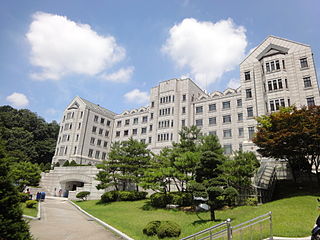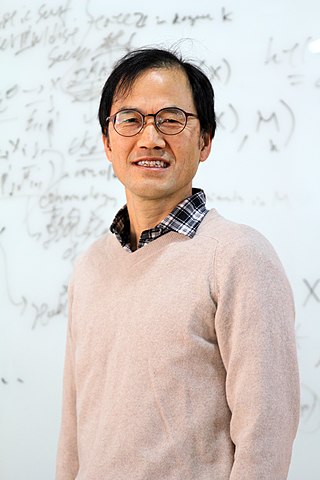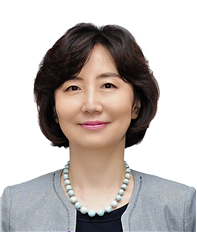Related Research Articles

Yeom Han-woong is a South Korean physicist. A tenured professor at POSTECH,he has led several research centers for the university and from 2013 in collaboration with the Institute for Basic Science. He is a Fellow of the American Physical Society and has served as vice chairman of the Korean government's first science and technology advisory group for three consecutive terms. With more than 300 publications to his name,his research has been cited over 5,000 times giving him an h-index of 40 and i10-index of 125.

Lee Young-hee is a South Korean physicist. He is a distinguished professor in physics and energy science at Sungkyunkwan University as a SKKU fellow. He is also director of the Center for Integrated Nanostructure Physics in the Institute for Basic Science (IBS). He has been a Clarivate Analytics Highly Cited Researcher in the cross-field category in 2018–2023.

The R. K. Cho Economics Prize is awarded by Yonsei University in Seoul,South Korea to academics in the field of economics who have contributed to the development of scholarship and education. As of 2018,the prize includes a plaque,a medal,and a monetary award of ₩100 million.

Koh Gou Young is a researcher from South Korea studying organ vasculature and lymphatic vessels with an interest in angiogenesis,lymphangiogenesis,adipogenesis,and cardiogenesis. His research has contributed to the publication of more than 200 journal articles,including multiple publications on how Tie2 deficits are related to sepsis,blood-retinal barrier damage,and an imbalance of intraocular pressure in Schlemm's canal which induces glaucoma.
The Korea Science Award is an award presented to South Koreans and Korean scientists working in domestic universities or research positions. It is currently jointly presented by the Ministry of Science and ICT and the National Research Foundation of Korea. Research achievements are limited to that of a single project conducted in Korea. Potential recipients go through a several stage review which includes consolation with foreign scholars.
Scientist of the Year Award is one of several awards given in South Korea by the Korea Science Journalists Association. From 1985,it was awarded to one individual. From 1999,it was given to three winners,each within their own category,which changed to one category and one winner in 1996,removed the category system from 2011,and allowed multiple winners the following year. Laureates receive a medal and 3 million KRW cash prize.

Kim Doochul is a South Korean theoretical physicist. He was head of the Department of Physics,director of the BK21 Physics Research Division,and professor emeritus at Seoul National University. He was also a fellow and chairperson in the Korean Academy of Science and Technology before becoming the fifth president of Korea Institute for Advanced Study and the second president of Institute for Basic Science. He was a standing trustee with the Asia Pacific Center for Theoretical Physics and a board of Trustee member of the Korean Physical Society.
The Young Scientist Award is a Korean award for young scientists under the age of 40 with research and development achievements in the natural sciences and engineering fields. Four recipients are selected on an annual basis. While the award is organized by the Korean Academy of Science and Technology,it is given on behalf of the president of Korea,and comes with prize money of initially KRW 30 million,and later KRW 50 million. Candidates for the award must be Korean or working within Korea at a university or research institute. The award is presented to natural science researchers in even-numbered years and engineering in odd-numbered years.

Yong-Geun Oh (Korean: 오용근) is a mathematician and distinguished professor at the Pohang University of Science and Technology and founding director of the IBS Center for Geometry and Physics located on that campus. His fields of study have been on symplectic topology,Floer homology,Hamiltonian mechanics,and mirror symmetry He was in the inaugural class of fellows of the American Mathematical Society and has been a member of Institute for Advanced Study,Korean Mathematical Society,and National Academy of Sciences of the Republic of Korea and is on the editorial boards of Journal of Gokova Geometry and Topology and Journal of Mathematics of Kyoto University.
The Korea Engineering Award is an award presented to South Koreans and Korean engineers working in domestic universities or research positions. It is currently jointly presented by the Ministry of Science and ICT and the National Research Foundation of Korea. Research achievements are limited to that of a single project conducted in Korea. Potential recipients go through a several stage review which includes consolation with foreign scholars. It is given annually to up to four individuals and is presented with the Korea Science Award. Prize money of KRW 30 million is given in addition to the award.
The National Academy of Sciences Award is an award presented to South Korean nationals who have made significant contributions to academic development through intensive research on a specific topic. Prize money of KRW 100 million is given in addition to the award. The award is given by the National Academy of Sciences of the Republic of Korea in accordance with Article 14 of the National Academy of Sciences of the Republic of Korea Act and Article 4 of the Academic Academy Prize Award Regulations. The first awards were given in 1955.

Inhee Mook-Jung is a South Korean scientist who works at the Seoul National University School of Medicine.
Top Scientist and Technologist Award of Korea (Korean: 대한민국최고과학기술인상) is one of two annual awards given in South Korea by the Korean Federation of Science and Technology Societies with the other being a government award for contribution to science and technology promotion. The Top Scientist and Technologist Award of Korea was started in 2003 as the successor to the Science and Technology Award of Korea which was established in 1968. The award is to foster honor and pride and create an environment in which people can focus on research and development by discovering and encouraging scientists and engineers with outstanding achievements who can represent South Korea. While previously given to multiple individuals,from 2003 only person is selected for each cycle. Laureates receive the award and 300 million KRW cash prize.
National Scientist of the Republic of Korea was an award bestowed between 2005 and 2012. The prize was established by the Ministry of Education,Science and Technology to achieve the world's best research results by providing research funds of 1.5 billion KRW per year to a total of 10 scientists. Research prize funding ended when their affiliation changed. Envisioned as the highest scientific award of the nation,it was initially presented to Hwang Woo-suk in 2005 under the name Top Scientist (최고과학자) with an annual funding prize of 3 billion KRW given over three years. Due to his scandal,the award was withdrawn from Hwang,the name of the prize was changed and the research funding was reduced. The reformed award was given in 2006,2007,2010 and last bestowed in 2012. The end of the award coincided with the founding of the Institute for Basic Science with five laureates changing their affiliation to the new institute.
The Woman Scientist/Engineer of the Year Award is an award presented to female South Koreans and Korean engineers to promote leadership of women in STEM fields. Each year three winners are selected,one in each category,and laureates are given KRW 10 million which is provided by the Ministry of Science and ICT.

The L’Oréal Korea-UNESCO for Women in Science Award is a national level award as part of the L'Oréal-UNESCO For Women in Science Awards. It is said to be Korea's most prestigious female scientist award. The award is presented by L'Oréal Korea,Korean National Commission for UNESCO,and Women’s Bioscience Forum. Every year one academic promotion award is presented and up to four fellowships to young scientists under the age of 44 are granted. Endowment is KRW 20 million for the award and KRW 5 million for the young scientists. The award was founded in 2002 and underwent name changes in 2004 and 2017.
The Inchon Award (Korean: 인촌상) is a prize given to individuals in public service,journalists,and academics for achievements in their field. The award is named after the nickname of Kim Seong-su;the second Vice President of South Korea and founder of Korea University,The Dong-a Ilbo and Gyeongseong Textiles. The annual award is presented with a prize of KRW 100 million,a citation and a medal on October 11 which is Kim's birthday.
The Sudang Award (Korean: 수당상) is an academic prize meant to honor the achievements of researchers and contribute to the development of technology and academics by awarding awards basic science,applied science,humanities and social sciences,and formerly natural science. The award is presented by the Sudang Foundation which is under Samyang Group. Laureates receive KRW 200 million and plaque as part of the award.
The Hong Jin-Ki Creator Award,sometimes referred to as the Yumin Award (유민상),is given every May to individuals or groups who have achieved creative achievements in the fields of science and technology,social sciences,and culture and arts. The award was made in honor of Hong Jin-ki and is funded and given by the Joongang Hwadong Foundation.
References
- ↑ "경암교육문화재단, 제7회 '경암학술상'수상자 발표" (in Korean). Kyosu Shinmun. 23 September 2011. Retrieved 16 September 2019.
- ↑ 석, 동빈 (22 November 2005). "송금조회장 출연 재단 경암학술상 4명 선정" (in Korean). The Dong-a Ilbo . Retrieved 16 September 2019.
- ↑ 윤, 봉학 (17 September 2018). "올 경암학술상, 자연과학 금종해·공학 손훈·특별상 권오곤". 국민일보 (in Korean). Retrieved 16 September 2019.
- ↑ 이, 종민 (12 September 2016). "제12회 경암학술상 수상자 4명 선정". Yonhap News Agency (in Korean). Retrieved 16 September 2019.
- ↑ "Academic Lectures by Laureates". Kyung-Ahm Education & Cultural Foundation. Retrieved 16 September 2019.
- ↑ "Kyung-Ahm Prize - Previous Laureates". Kyung-Ahm Education & Cultural Foundation. Retrieved 16 September 2019.